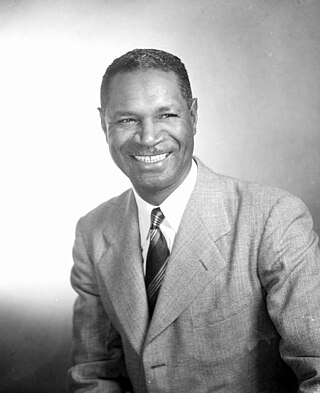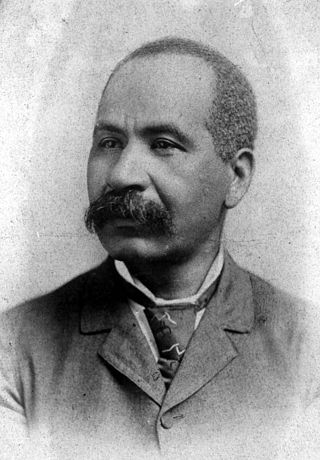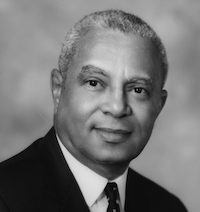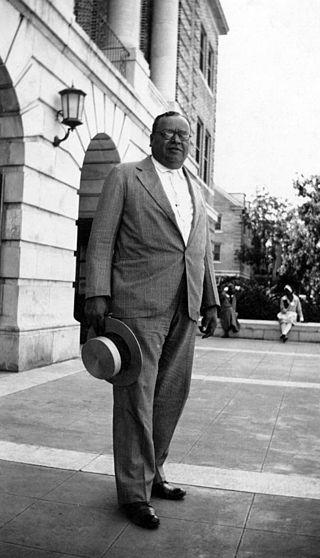Related Research Articles

Leon County is a county in the Panhandle of the U.S. state of Florida. It was named after the Spanish explorer Juan Ponce de León. As of the 2020 census, the population was 292,198.

Florida Agricultural and Mechanical University (FAMU), commonly known as Florida A&M, is a public historically black land-grant university in Tallahassee, Florida. Founded in 1887, It is the third largest historically black university in the United States by enrollment and the only public historically black university in Florida. It is a member institution of the State University System of Florida, as well as one of the state's land grant universities, and is accredited to award baccalaureate, master's and doctoral degrees by the Commission on Colleges of the Southern Association of Colleges and Schools.

Charles Henry Chapman was an American academic and one of the founders of Alpha Phi Alpha, the first Greek letter fraternity for African American men. He is known for advancing agricultural education and fraternal organizations.

Alonzo Smith "Jake" Gaither was an American college football coach and athletics administrator. He served as the head football coach at Florida A&M University (FAMU) for 25 years, from 1945 to 1969, compiling a record of 204–36–4. His won–loss record is among the best of any college football coach.
The history of Tallahassee, Florida, much like the history of Leon County, dates back to the settlement of the Americas. Beginning in the 16th century, the region was colonized by Europeans, becoming part of Spanish Florida. In 1819, the Adams–Onís Treaty ceded Spanish Florida, including modern-day Tallahassee, to the United States. Tallahassee became a city and the state capital of Florida in 1821; the American takeover led to the settlements' rapid expansion as growing numbers of cotton plantations began to spring up nearby, increasing Tallahassees' population significantly.

The Carnegie Library at FAMU is a historic building on the campus of Florida A&M University in Tallahassee, Florida. Built in 1908, the two-story, white-columned building was added to the National Register of Historic Places in 1996. "It was part of a national building program by philanthropist Andrew Carnegie." The Black Archives was established by the Florida Legislature in 1971 and opened in 1975. It was one of many public and college libraries funded by Andrew Carnegie, which were named Carnegie Library after him. It is the oldest brick building on the campus and the first Carnegie Library to be built on a black land-grant college campus.
William Patrick Foster, also known as The Law and The Maestro, was the director of the noted Florida A&M University Marching "100". He served as the band's director from 1946 to his retirement in 1998. His innovations revolutionized college marching band technique and the perceptions of the collegiate band. Foster was inducted into the Florida Artists Hall of Fame, the National Association for Distinguished Band Conductors Hall of Fame, the Florida Music Educators Association Hall of Fame and the Afro-American Hall of Fame among others. He also served as the president of the American Bandmasters Association and was appointed to the National Council on the Arts by President Bill Clinton. Foster wrote the book titled The Man Behind the Baton.

Frederick Stephen Humphries Sr. was an American academic administrator and chemistry professor who served as President of Tennessee State University, and President of Florida A&M University. He was also President and CEO of the National Association for Equal Opportunity in Higher Education from 2001 to 2003. Florida A&M University conferred the President Emeritus title upon him on December 11, 2009. He was Regent Professor at the Florida A&M University College of Law from 2003 until his retirement in 2014.

The Alfred Lawson Jr. Multipurpose Center and Teaching Gymnasium is a 9,639-seat multi-purpose arena in Tallahassee, Florida on the Campus of Florida A&M University. It was built in 2009 and it is home to the Florida A&M men's and women's basketball teams and women's volleyball team. The arena replaced Jake Gaither Gymnasium, which is a 3,365-seat multi-purpose arena. The Al Lawson Center is the second biggest arena in Tallahassee, behind the 12,500-seat Donald L. Tucker Civic Center. The official ribbon cutting ceremony was April 8, 2009.
Florida A&M University College of Law or FAMU College of Law is an ABA-accredited law school in Orlando, Florida, United States. It is part of Florida A&M University.

Thomas DeSaille Tucker or Thomas DeSaliere Tucker was an African-born lawyer, educator, and missionary. He was the first president of the State Normal College for Colored Students, which eventually became Florida Agricultural and Mechanical University.

Joseph Henry Reason was an American librarian. He was director of the Howard University library system for 25 years. He was the first African-American to serve as president of the Association of College and Research Libraries (ACRL) and to be nominated for president of the American Library Association (ALA). In 1999, American Libraries named him one of the "100 Most Important Leaders We Had in the 20th Century". His son, J. Paul Reason, was the first African-American four star Admiral in the United States Navy.

John Robert Edward Lee Sr. was an early leader in African-American education. He served as the third President of Florida Agricultural and Mechanical University, a historically black college, from 1924 to 1944.

Flossie M. Byrd was a home economist, family and consumer services scientist, educator, and the first provost and vice president for academic affairs at the public historically black university (HBCU), Prairie View A&M University (PVAMU) in Prairie View, Texas. She taught in Florida public high schools and at Florida A&M University in Tallahassee, Florida before moving to PVAMU. She earned a PhD in Home Economics Education with minors in child development and educational psychology and measurement from Cornell University in 1963. Her research interests included concept formation, family membership disability, and family resource management.

Sybil Lenora Collins Mobley was Dean Emerita of the Florida Agricultural and Mechanical University (FAMU) School of Business and Industry. She led its business program and was the founding dean of its Business School. She also oversaw community projects including a revitalization program for majority African American Gretna, Florida.
Elmira Mangum is an American educator and retired university administrator, who served as President of Florida A&M University from 2014 to 2017. She was the 11th President of FAMU and the first woman to permanently hold the position in the 128-year history of the university. She served as President until March 2017, but was on administrative leave from September 2016 to March 2017.

Florida Agriculture & Mechanical Hospital (1911-1971) was the first institution in Florida providing medical care to African Americans, who, during the segregation period, were not permitted to receive care at whites-only hospitals. There was no other such institution within 150 miles (240 km) of Tallahassee. In 1940, "less than a dozen" counties in Florida had hospital facilities for Negroes.
The Florida Interscholastic Athletics Association was, during segregation, the organization of the athletic programs black high schools in Florida. It divided schools into classes to match teams from similar schools, and set up game schedules. It existed from 1932 — earlier than that there were too few black high schools — to 1968, when Florida schools integrated.
Makola M. Abdullah is the 14th president of Virginia State University (VSU). Prior to his appointment as president of Virginia State University, Abdullah served as provost and senior vice president at Bethune-Cookman University in Daytona Beach, Fla. (2013-2016), provost and vice president for academic affairs at Florida Memorial University in Miami Gardens, Fla. (2011-2013), and dean and director of 1890 land grant programs at Florida Agricultural and Mechanical University in Tallahassee, Fla (2008-2011).
The Florida State Teachers Association (FSTA) was an organization of Black educators, administrators, other staff, and parents in Florida. African American teachers faced discrimination and underfunded schools. Educators in the group served as activists advocating for civil rights and educational opportunities.
References
- 1 2 3 "In Memorim: Leedell Wallace Neyland, 1921-2020". The Journal of Blacks in Higher Education. June 17, 2020.
- ↑ "FAMU's Neyland leaves behind a stack of history books". Tallahassee Democrat. 2006-04-30. pp. 1B, 2B . Retrieved 2023-11-26.
- ↑ "Leedell Wallace Neyland Collection". Library of Congress, Washington, D.C. 20540 USA.
- 1 2 Neyland, Leedell W. (November 26, 1970). "Twelve Black Floridians". Tallahassee, Florida Agricultural and Mechanical University Foundation – via Internet Archive.
- ↑ "Leedell W. Neyland's research works | Florida A&M University, FL (FAMU) and other places".
- ↑ "Book Briefs". Las Vegas Review-Journal. 2011-07-19. Retrieved 2023-11-26.
- ↑ "EDUCATOR URGING BLACKS TO TAKE COLLEGE EXAMS". February 28, 1986.
- ↑ "Remembering the life of KATRINA BROWN". obituaries.reviewjournal.com.
- ↑ Neyland, Leedell W. (November 26, 1958). "The Negro in Louisiana Since 1900: An Economic and Social Study/ Leedell Wallace Neyland". New York University. – via Google Books.
- ↑ Jackson, David H.; Elliott, Kimberlyn M. (2016). "African Americans in Florida, 1870-1920: A Historiographical Essay". The Florida Historical Quarterly. 95 (2): 186. ISSN 0015-4113. JSTOR 44955672.
- ↑ Callcott, George H. (1964). "Review of The History of Florida Agricultural and Mechanical University". The Florida Historical Quarterly. 43 (1): 72–73. ISSN 0015-4113. JSTOR 30140078.
- ↑ "Twelve Black Floridians, by Leedell W. Neyland". Florida Agricultural and Mechanical University Foundation. November 26, 1970 – via Google Books.
- ↑ Hall, Willie B. (2021-02-25). "The Florida Interscholastic Athletic Association 1932-1968". Free Press of Jacksonville. Retrieved 2023-11-26.
- ↑ "HIS COURAGE CHANGED BLACK ATHLETES' FUTURE". Orlando Sentinel. 1988-11-29. Retrieved 2023-11-26.